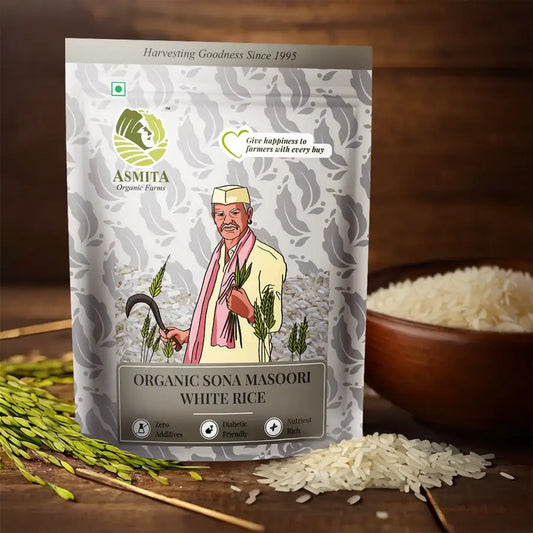1. What is organic flour?
Organically sourced flour is produced using organic farming practices without synthetic fertilisers, pesticides, or genetically modified organisms (GMOs). It is flour obtained from grains grown according to organic farming standards.
Depending on the desired end product, organically produced flour can be made from various grains such as wheat, millet, ragi, or pearl millet.
One of the key advantages of organically sourced atta is that it is free from harmful chemicals and additives commonly found in conventionally grown grains.
Organic flour can also be available in gluten-free options for individuals with gluten sensitivities or celiac disease.
Gluten-free flours are typically made from grains that naturally do not contain gluten, such as millet or ragi flour. These alternatives provide a safe and healthy option for those who need to avoid gluten. When using organically sourced flour, it is important to note that the texture and taste may vary slightly compared to conventional flour.
However, many people appreciate the unique flavours and textures it can bring to baked goods. At AsmitA Organic Farms, you can get the best online price for naturally-grown flour.
2. Is organic flour good for health?
Organic flour, particularly when made from grains like millet, ragi, pearl millet, or wheat, can be beneficial for health due to several reasons:
Nutritional Value: Organic flour retains more nutrients compared to conventionally grown flour. It tends to contain higher levels of vitamins, minerals, and antioxidants, contributing to a more nutritious diet.
Gluten-Free Options: For individuals with gluten sensitivities or celiac disease, organic, gluten free flours made from grains like millet or ragi can be an excellent alternative. These flours allow people to enjoy a variety of baked goods without experiencing adverse reactions.
Digestive Health: The absence of pesticides and GMOs in organically sourced atta may help reduce the risk of digestive issues associated with conventional flour.
Environmental Impact: Choosing organic flour supports sustainable farming practices prioritising soil health, biodiversity, and water conservation. While this flour offers potential health benefits, it is important to note that moderation and overall dietary balance are key when consuming this flour.
Incorporating a variety of whole grains and other nutrient-dense foods into one's diet is crucial for overall well-being. Visit AsmitA Organic Farms and know more about affordable cost options on flour!
3. Can organic flour be eaten daily?
Organically sourced flour can be consumed daily as part of a healthy and balanced diet. However, it is important to consider the quantity and how it is incorporated into meals.
Consuming flour in your daily diet in moderation and as part of a varied meal plan is recommended. This ensures that you benefit from a diverse range of nutrients from other food sources.
Incorporating different types of organic atta, such as millet flour, ragi flour, pearl millet, or gluten-free options, can provide a wider array of nutrients and flavours.
For example, you can use millet flour to make pancakes or ragi flour in baked goods.
Combining GMO-free flour with other nutrient-rich ingredients like vegetables, fruits, lean proteins, fibres, water, and healthy fats is also important. This helps create a well-rounded meal that provides a good balance of nutrients.
By incorporating organic cold pressed flour into your diet appropriately and diversifying your overall food choices, you can enjoy its benefits while maintaining a healthy and well-rounded approach to nutrition. Buy now from AsmitA Organic Farms!
4. What is the difference between natural and organic flour?
Natural and organic flour differ in the farming methods and regulations followed during production.
Natural flour refers to flour that is minimally processed and doesn't contain any artificial additives or preservatives. It may be produced from conventionally grown grains involving synthetic fertilisers, pesticides, and GMOs.
While natural flour may not have artificial additives, it doesn't guarantee that the grains used were cultivated using organic farming practices.
In contrast, organic atta is produced from grains grown using organic farming methods. Organic farming avoids synthetic fertilisers, pesticides, and GMOs. It prioritises soil health, biodiversity, and environmental sustainability.
Organically sourced flour is regulated and certified to meet specific organic standards, ensuring that it is free from harmful chemicals and genetically modified organisms. Organic millet flour, ragi flour, pearl millet, or gluten-free options offer a healthier and more environmentally friendly choice than natural flour.
It assures that the grains used are free from synthetic chemicals and supports the well-being of individuals and the planet.
5. What are the benefits of organic flour?
Organically sourced flour, derived from organic whole grains such as Bajra, Jowar, Ragi, Chana dal, or wheat, offers a range of benefits that extend beyond personal health:
Enhanced Soil Health: Organic farming methods for producing this atta prioritise the soil's health by avoiding synthetic fertilisers and pesticides. This promotes soil fertility, improves water retention, and encourages the growth of beneficial microorganisms, leading to sustainable agriculture practices.
Flavour and Culinary Excellence: Many people find that organic sourced atta offers a distinct and often enhanced flavour compared to conventionally produced flour. The unique characteristics of organically grown grains and sustainable farming practices can result in a more flavourful and enjoyable culinary experience.
Reduced Antibiotic Use: Organically-grown flour derived from organically produced grains typically avoids using antibiotics in animal feed, as organic farming practices prioritise the well-being of livestock. Choosing natural flour can contribute to reducing antibiotic resistance and promoting animal welfare.
Positive Social Impact: Organic farming often promotes fair trade practices, ensuring farmers receive fair product compensation.
By purchasing organically-grown produce, including flour, consumers can support a more equitable and sustainable food system, benefiting farmers and workers in the organic supply chain.






































